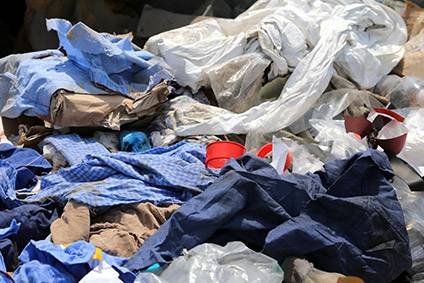
UK waste recycling charity WRAP will officially launch its ten-year voluntary clothing and textile waste programme later this month, which aims to slash the environmental impact of UK clothing and home fabrics through practical interventions along the entire textiles chain.
First unveiled in November, Textiles 2030 has already secured commitment from more than ten brands and retailers, 20 re-use/recycling organisations and ten affiliates, meaning it is on track to have half the UK market signed up when it begins. The first major high-street names to join include John Lewis, M&S, Next, Primark, Sainsbury’s, Ted Baker and Tesco.
Due to launch officially on 26 April, the Textiles 2030 Roadmap will set out water and carbon reduction targets, and the key milestones and activities to introduce circularity at scale. These goals will help transform the UK’s make-use-dispose fashion culture into one where products are made sustainably, used longer and then re-used or recycled, WRAP says.
The Target-Measure-Act approach will be used so that textile businesses set tough targets, measure impact and track progress on both an individual business basis and towards national targets and public reporting.
Textiles 2030 environmental targets are:
- Cut carbon by 50%, sufficient to put the UK textiles sector on a path consistent with limiting global warming to 1.5°C, in line with the Paris Agreement on climate change and achieving Net Zero by 2050 at the latest.
- Reduce the aggregate water footprint of new products sold by 30%.
“The UK Parliament has investigated the textiles sector twice in recent years and is now looking at UK fashion companies to act, says Marcus Gover, CEO of WRAP. “Our research shows that consumers want sustainable clothes, not disposable fashion. Textiles 2030 is about transforming textiles and creating a fashion sector fit for the future. We need fast, effective action from businesses more than ever. Brand and retail signatories must show their commitment by signing up to Textiles 2030. Businesses who fail to engage will be noticeable by their absence. If your business is not already involved in Textiles 2030, now is the time to sign up.”

US Tariffs are shifting - will you react or anticipate?
Don’t let policy changes catch you off guard. Stay proactive with real-time data and expert analysis.
By GlobalDataThe agreement builds on the foundation of the SCAP 2020 (Sustainable Clothing Action Plan) voluntary agreement, which saw businesses respond to growing public demand for fashion with a softer environmental footprint, by adopting robust measurement and targeted action.
The UK’s Textiles 2030 is the first national agreement in what will become a global network of new initiatives to reduce the environmental impact of clothing around the world, led by WRAP.
This new wave will be coordinated under the Textiles Action Network, which is being developed by WRAP and supported by the Laudes Foundation. The project will deliver what is claimed to be the first readymade plan to achieve global circular economy targets on clothing by co-ordinated national action. These plans can be used by individual nations and tailored to suit their circumstances, whilst still directing action towards global targets.
WRAP, in partnership with the World Resources Institute (WRI), will develop a set of globally relevant targets and will launch the second commitment, in Denmark, in summer 2021.
Earlier this year, WRAP published best-practice guidance to help retailers, brands, and their re-use and recycling partners set up new schemes from scratch, or to improve existing take-back schemes to increase clothing recycling in the UK.




